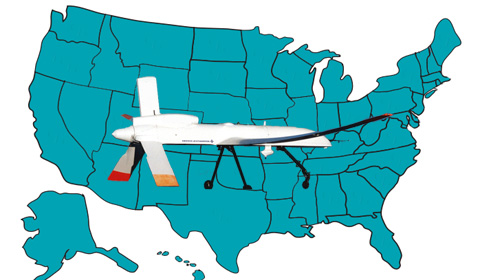
While Congress has been considering the idea of regulating domestic drone use for some time, yesterday kicked off the debate in earnest when Sen. Patrick Leahy (D-Vt.) called a hearing in the Senate Judiciary Committee on "The Future of Drones in America: Law Enforcement and Privacy." Considering everything the committee has on its plate right now—from immigration reform to gun regulations—the fact that the senators prioritized this hearing underscores how important and timely they believe the issue is, and how much impact drones have had on the American psyche.
In a rare show of bipartisanship, members from both sides of the aisle voiced privacy concerns about the coming drone invasion. Sen.Chuck Grassley (R-Iowa) raised concerns about the place of drones in a free society. Sen. Ted Cruz (R-Texas) spoke strongly about how the lives of everyday Americans are increasingly being monitored and how an explosion of drone use would accelerate this. Sen. Richard Durbin (D-Ill.) worried that, "with law enforcement on one side and commercial industry on the other," Americans were losing their right to be left alone. Leahy, Feinstein, and Franken echoed these comments.
In addition, we do have to set the record straight on one point. During the hearing, the representative from the Association for Unmanned Vehicle Systems International claimed the ACLU supports its proposed guidelines for drones. While we appreciate the shout out, this is absolutely not true. While we encourage the industry to consider privacy safeguards in drone use, the ACLU favors the need for legislation to regulate civil drone use in U.S. airspace. As the Electronic Privacy Information Center's Amie Stepanovich argued in the hearing, we need "technology neutral" legislation so that laws would stay relevant with future innovations.
Two bills have recently been introduced to do just that. Last month Rep. Poe (R-Texas) introduced the Preserving American's Privacy Act and yesterday Rep. Markey (D-Mass.) dropped The Drone Aircraft Privacy and Transparency Act (DAPTA). Both bills would require warrants for the use of drones by law enforcement in a criminal investigation, and regulate data collection, minimization, and disclosure. While there are many valuable uses for drones, potential abuse raises serious concerns about the impact on the constitutional and privacy rights of American citizens. We are pleased to see so much bipartisan support for regulating drone use and look forward to seeing the conversation continue.
Learn more about domestic drones and other civil liberty issues: Sign up for breaking news alerts, follow us on Twitter, and like us on Facebook.
